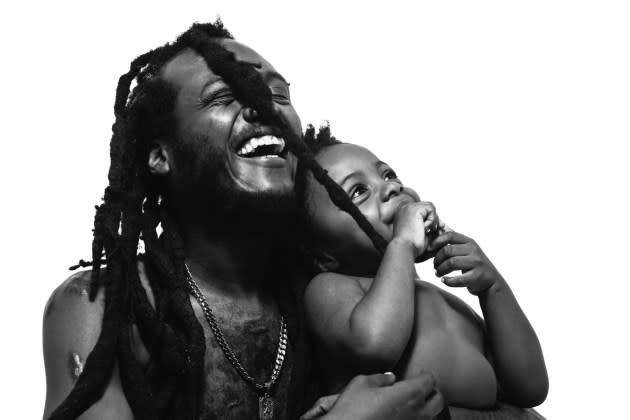Samory-I’s ‘Strength’ is a Brilliant Reboot of Roots Reggae Tradition
- Oops!Something went wrong.Please try again later.

Religiosity isn’t a particularly good look lately, at least as it’s being performed by politicians. Artists, though — especially one the caliber of Jamaica’s Samory-Tour Frazer, a.k.a. Samory I — can still conjure the unifying power, beauty and healing that religion sometimes brings. Samory made this clear on Black Gold, his promising 2017 debut, with its Rastafarian calling card “Rasta Nuh Gangsta,” a policy brief to a local cop book-ended by Nyabinghi drumming and a potent dub breakdown. And his new album Strength is, even more so, a deeply spiritual and handsomely rangy reboot of the roots reggae genre, drawing deep from the music’s rich history while re-focusing it on the now.
“Outside Ft. Lila Iké” establishes that straight away, opening on a haunted synth wash that’s hardly roots vernacular; neither is the nu-metal guitar grind that soon bubbles up. Then, over a martial riddim, comes not a standard chant-down of Babylon, but a testimonial about battling inner darkness. In a high-tenor style that harks back to Eighties singjay heroes like Barrington Levy and Eek-A-Mouse, Samory carves out time for self-care (with herb and headphones, naturally) and to “step away from the madness,” expressing gratitude for his family, and “counting the winnings/ From humble beginnings.” Positivity rarely sounds this muscular. Equally impressive is the hand-off of his album’s second verse to Lila Iké, whose gorgeous flow — bringing praise to Jah and nodding to Althea & Donna’s “Uptown Top Ranking” — feels like a breakout moment. The spotlight-share is generous and telling at a moment when the baked-in sexism of many religions, Rastafarianism included, is rightfully under the microscope (NB: poet Safiya Sinclair’s justly celebrated memoir, How To Say Babylon).
More from Rolling Stone
Bad Bunny, Karol G, Daddy Yankee, and More Stars Want This Reggaeton Lawsuit Thrown Out
David Bowie's Greatest Album Is Getting a Must-Hear Reggae Overhaul
'The Harder They Come' Was a Hero's Journey Set to Reggae. It's About to Become a New Musical
The top-shelf production and beats here come via Winta James, a go-to for Jamaica’s new roots school (Chronixx, Protoje). James is a modern classicist — a sort of reggae Dave Cobb — who is well-versed in vintage dub vibes and clearly plays well with studio vets. “Ocean” is lover’s rock sweetened with a sample from Gregory Isaac’s iconic “Soon Forward.” An all-star band, including drummer Squidly Cole (Barrington Levy, Ziggy Marley) and trombonist Henry Tenyue (Aswad, Dennis Bovell), powers the mournful “My Son,” about the death of Samory’s firstborn.
The tone throughout Strength is by turns optimistic, rueful, and paternal. “History of Violence,” Samory’s duet with Mortimer — another striking new-school singer with a similarly haunting voice — is the most notable example of the latter, as the men ponder legacies that lead to bloodshed (“Bad man come in inna di broad day/ AR-15 clear di hallway”) over incongruously sweet r&b. And if the like-minded “Wrath” verges on the preachy, the spit-fest with fellow rising star Kabaka Pyramid and elder statesman Capleton gets over on sheer technique and passion, with Samory’s wise voice on the chorus, calling out a lost generation with a plea for changing course. Here’s hoping he gets heard, both for his spiritual high-mindedness and his musical talents, which are making reggae once again a force to be reckoned with.
Best of Rolling Stone
